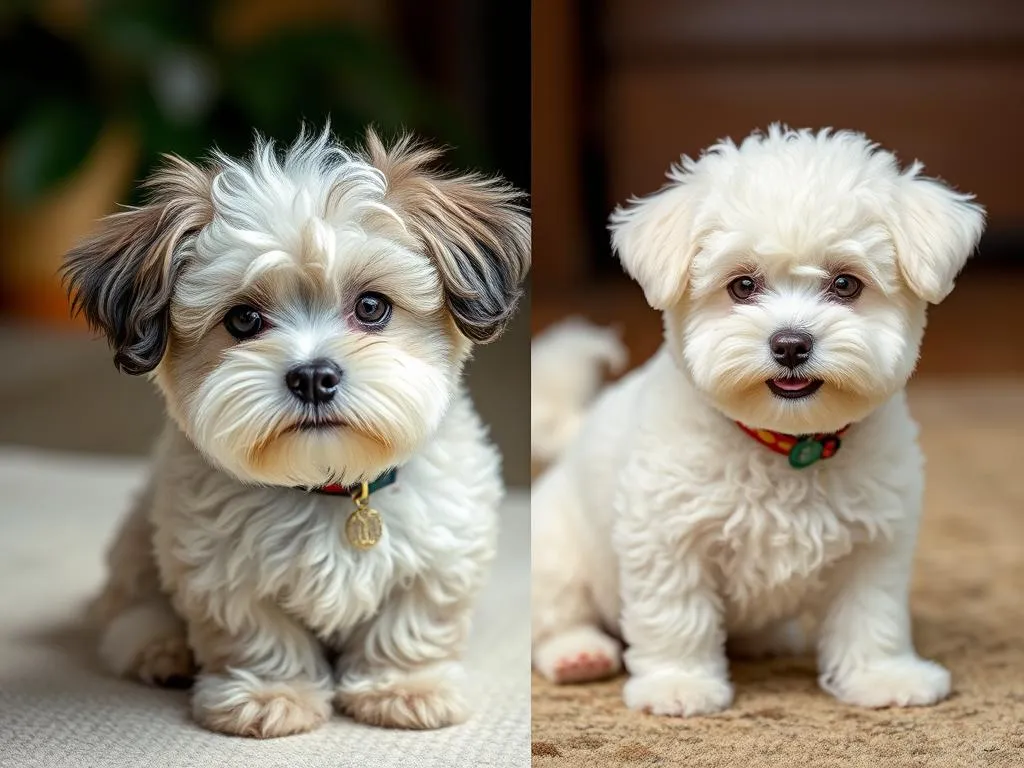
Choosing a dog breed is a significant decision for any prospective pet owner. With various breeds available, each with unique characteristics and traits, understanding the differences is essential. Among the popular small breeds, the Bichon Frise and Maltipoo stand out for their charm and companionship. Below, we explore these two beloved breeds in depth.
Breed Overview
What is a Bichon Frise?
The Bichon Frise is a delightful breed known for its cheerful disposition and fluffy white coat. This breed has a rich history, believed to have originated in the Mediterranean region as early as the 13th century. Bichon Frises were favored by royalty and were often seen in the company of nobility.
In terms of physical characteristics, Bichon Frises typically stand about 9.5 to 11.5 inches tall and weigh between 12 to 18 pounds. Their coat is soft and curly, which gives them their signature appearance. The most common color is white, although they can also have shades of cream or apricot.
Temperamentally, Bichon Frises are known for their playful and affectionate nature. They are sociable dogs, thriving on human interaction and are often characterized by their friendliness towards both people and other pets. Their cheerful demeanor makes them excellent companions.
What is a Maltipoo?
The Maltipoo is a charming hybrid breed, combining the Maltese and the Poodle. This breed has gained immense popularity in recent years, particularly for its friendly disposition and low-shedding coat. The Maltipoo’s history is relatively recent, emerging in the late 20th century as designer dogs became more sought after.
Maltipoos vary in size, typically standing between 8 to 14 inches tall and weighing around 5 to 20 pounds, depending on whether they are bred from a toy or miniature Poodle. Their coats are soft and can be wavy or curly, coming in various colors, including white, cream, apricot, and even black.
With their affectionate and intelligent nature, Maltipoos make excellent family pets. They are known for their playful behavior and strong desire to please, making training relatively straightforward. Their friendly demeanor allows them to bond well with children and other pets.
Comparison of Key Characteristics
Size and Weight
When comparing the Bichon Frise and Maltipoo, one notable difference is their size. The Bichon Frise generally has a more consistent height and weight, whereas Maltipoos can vary significantly based on their Poodle parent.
Bichon Frise:
– Average Height: 9.5 to 11.5 inches
– Average Weight: 12 to 18 pounds
Maltipoo:
– Average Height: 8 to 14 inches
– Average Weight: 5 to 20 pounds
The size of each breed affects their care and living space requirements. Bichon Frises, being slightly larger, may require a bit more room, while Maltipoos, especially those on the smaller side, can adapt well to apartment living.
Coat and Grooming Needs
Both breeds boast beautiful coats, but they come with different grooming needs.
Bichon Frise:
The Bichon Frise has a double coat that requires regular grooming to prevent matting. They should be brushed several times a week and require professional grooming every 4 to 6 weeks to maintain their fluffy appearance. While they are considered hypoallergenic, they do shed, although minimally.
Maltipoo:
The Maltipoo’s coat can vary depending on whether it takes after the Maltese or Poodle. Generally, they have a low-shedding coat that also requires regular grooming. Daily brushing is often recommended for Maltipoos to keep their coats healthy and free of tangles. Like the Bichon, they are also considered hypoallergenic.
Both breeds can be suitable for allergy sufferers, but it’s essential to spend time with each breed before making a choice to ensure compatibility.
Temperament and Behavior
Both the Bichon Frise and Maltipoo are known for their friendly and affectionate personalities, but they have distinct traits.
Bichon Frise:
These dogs are playful, lively, and known for their sociability. They enjoy being around people and often get along well with other pets. Their energy levels are moderate, and they require regular playtime and interaction.
Maltipoo:
Maltipoos are also affectionate and intelligent, often forming strong bonds with their owners. They are playful and enjoy engaging in activities but can show a slightly more independent streak compared to Bichon Frises. Their adaptability makes them suitable for various lifestyles.
In terms of trainability, both breeds respond well to positive reinforcement, although Maltipoos may require a bit more patience due to their Poodle heritage, which can sometimes lead to a stubborn streak.
Health Considerations
Common Health Issues
When considering a dog, it’s important to be aware of potential health issues that may arise.
Bichon Frise:
Common health issues include skin allergies, dental problems, and hip dysplasia. Their lifespan is generally around 12 to 15 years.
Maltipoo:
Maltipoos can experience a range of health issues, including patellar luxation, allergies, and respiratory issues, particularly if they inherit traits from the Poodle parent. Their lifespan typically ranges from 10 to 15 years.
Preventative Care and Health Maintenance
Regular veterinary check-ups, vaccinations, and preventative care are vital for both breeds. Maintaining a balanced diet and ensuring regular exercise can also help mitigate health risks. Both breeds benefit from routine dental care, as dental health can significantly impact their overall well-being.
Lifestyle Compatibility
Ideal Living Environment
The living environment plays a crucial role in the happiness of a dog.
Bichon Frise:
Bichon Frises adapt well to various living situations but thrive in environments where they receive ample attention and engagement. They are suitable for both apartments and houses, provided they get enough exercise.
Maltipoo:
Maltipoos are highly adaptable and can do well in smaller spaces, making them a great choice for apartment living. However, they still require regular walks and playtime to stay happy and healthy.
Family Compatibility
Both breeds are excellent companions for families, but their interactions can vary.
Bichon Frise:
Bichon Frises are typically great with children and can be social with other pets. Their playful nature makes them excellent playmates.
Maltipoo:
Maltipoos are also known for being good with children and can adapt well to family life. Their affectionate nature makes them ideal for families looking for a loving pet.
Both breeds require socialization from an early age to ensure they grow up to be well-adjusted adults.
Training and Socialization
Training Ease and Techniques
Training is a crucial aspect of dog ownership, and both breeds offer unique challenges.
Bichon Frise:
While Bichon Frises are generally eager to please, they can be a bit stubborn at times. Positive reinforcement methods work best, and consistency is key.
Maltipoo:
Maltipoos are intelligent and can learn commands quickly, but they may have a tendency to be a bit mischievous. Early socialization and training are essential to curb any unwanted behaviors.
Behavioral Issues
Both breeds may face certain behavioral challenges.
Bichon Frise:
Common behavioral issues include separation anxiety and excessive barking. Providing mental stimulation and regular playtime can help alleviate these problems.
Maltipoo:
Maltipoos can sometimes exhibit signs of anxiety, especially if left alone for extended periods. They may also become territorial. Addressing these behaviors through training and socialization can be effective.
Cost of Ownership
Initial Costs
When considering a new pet, understanding the initial costs is essential.
Bichon Frise:
Purchasing a Bichon Frise from a reputable breeder typically costs between $500 to $2,500, depending on factors such as pedigree and location. Adoption fees may be lower.
Maltipoo:
Maltipoos generally range from $1,000 to $3,000 when purchased from a breeder. Adoption options may be available at a lower cost.
Ongoing Expenses
Ongoing expenses can add up quickly.
- Grooming Costs: Both breeds require regular grooming, with costs averaging around $50 to $100 per session.
- Food and Health Care Expenses: Expect to spend about $300 to $500 annually on food, and healthcare expenses can vary widely based on specific needs.
- Miscellaneous Costs: Toys, training classes, and other supplies can add anywhere from $100 to $300 annually.
Conclusion
In comparing the Bichon Frise vs Maltipoo, both breeds present unique characteristics that appeal to different lifestyles. The Bichon Frise is known for its sociable and playful nature, while the Maltipoo is celebrated for its intelligence and adaptability.
Ultimately, the decision between these two charming breeds should be based on your lifestyle, living situation, and personal preferences. Each breed offers companionship and love, ensuring that whichever you choose, you will have a loyal friend by your side.









